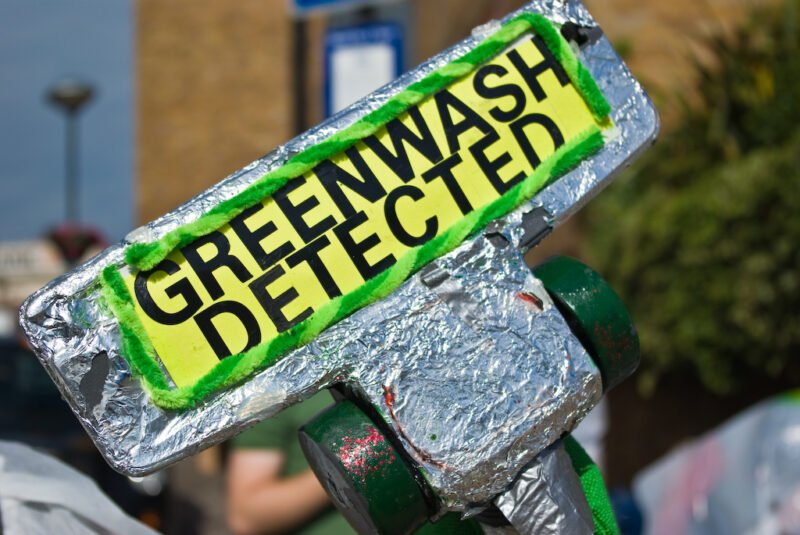Australia explores ways to combat widespread greenwashing of carbon emissions

The Greenwash Guerillas at the Business Design Centre, London 2008 – Photo courtesy Flickr user fotdmike (CC BY-NC-ND 2.0)
‘Greenwashing’, the 2021 Swiss financial word of the year, certainly dominated climate crisis headlines in 2022. It attracted considerable discussion in Australia before, during and after the November 2o22 COP27 UN climate conference and, given Aussie voters’ steadfast fixation on environmental issues in the 2022 election, will likely continue to do so in the coming years. The new Aussie government has taken note of this and is taking steps to reign in freewheeling greenwashing and hold businesses to account.
The word ‘greenwashing‘ (a spin on the term ‘whitewashing’) refers to the corporate marketing strategy of appearing environmentally friendly in order to sell products or promote a brand. A classic greenwashing complaint is that many brands spend more time, energy, and resources making themselves appear green rather than actually engaging with emission or waste issues in meaningful ways.
The Australia Institute think tank released its state-sponsored greenwashing report in October 2022 criticising the Australian government, describing an environment where the state perpetuates and encourages greenwashing campaigns: The negative analysis applies to both the previous government and the New Labor government elected in May 2022. The report is particularly critical of the use of carbon emissions offsets.
The fossil fuel industry and major emitters have set Australia’s policy agenda on climate. The result is a comprehensive policy framework where misleading climate claims by industry are not only accepted, they are actively sponsored by Federal Government.
The Australian Securities and Investments Commission (ASIC) is making greenwashing a priority moving forward, namely cracking down on ‘misleading conduct in relation to sustainable finance including greenwashing’. It provides advice on how to avoid financial greenwashing:
Greenwashing distorts relevant information that a current or prospective investor might require in order to make informed investment decisions. It can erode investor confidence in the market for sustainability-related products and poses a threat to a fair and efficient financial system.
But corporate greenwashing extends far beyond energy companies. Australia’s consumer watchdog, the Australian Competition and Consumer Commission (ACCC), is targeting a wide range of businesses, noting in a statement: “At least 200 company websites will be reviewed in the sweep for misleading environmental claims across a range of targeted sectors including energy, vehicles, household products and appliances, food and drink packaging, cosmetics, clothing and footwear.” ACCC Deputy Chair Delia Rickard added:
As consumers become increasingly interested in purchasing sustainable products, there are growing concerns that some businesses are falsely promoting their environmental or green credentials. Misleading claims about products or services undermine consumer trust and confidence in the market.
Superannuation fund Cbus, one of the nation’s largest investors, is targeting greenwashing by companies as part of its responsible investment strategy.
Even the fashion industry has copped criticism. According to an Australian Broadcasting Corporation (ABC) investigation, as consumers shy away from fast fashion, some clothing brands leaning into sustainable-themed marketing, with little substance to back them up:
As consumers become aware of the environmental cost of fast fashion, brands are finding new ways to market their clothing as sustainable.
They might spruik the fast-growing nature of bamboo or lower carbon footprint of organic cotton, or tout the benefits of recycled polyester…
But the end results aren't always what they're made out to be.
It cites a report by the Netherlands non-profit Changing Markets Foundation which argues that certification schemes and voluntary initiatives are counterproductive:
…as fashion’s toll on the environment has worsened, these schemes have proliferated and have become part of the problem by giving the illusion of sustainability in the sector whilst being unable to show any evidence of change created.
Brands are also freely using their membership of such initiatives to greenwash and even escape government scrutiny.
ProjectCECE, which claims to have ‘done the hard work so that you can find sustainable products as easily as possible’, has a recent guide promoting some of these certification schemes:
A sustainable fashion certification is given by an independent third party to confirm that a brand meets specific standards from an eco-friendly or ethical point of view.
However, the Changing Markets report was harsh in its assessment of current practices:
Most of the initiatives analysed in this report fail to meaningfully uphold high levels of ambition and thus merely provide a smokescreen for companies that want to appear to be taking steps towards sustainability. The majority do not set strict requirements and timelines for their members to progressively raise their ambition, but instead provide different modules with differing requirements, allowing companies with lacklustre ambition to still join.
Users on Mastodon have joined in on the conversation through the #greenwashing hashtag. This recent post links to a background piece by the Society of Environmental Journalists (SEJ) on climate disinformation, especially public relations ‘campaigns run for the fossil fuel industry’:
In November, Inside Football’s Andrew Warshaw reported on concerns that Qatar and FIFA were greenwashing the World Cup:
FIFA’s claim that the Qatar World Cup will be carbon neutral has been rubbished by leading climate experts as dangerous and misleading while environment activists have filed complaints with advertising regulators in several European countries over alleged “greenwashing”
But it's not all bleak, as things seem to be taking a more positive turn down under. The Guardian reported an apparent U-turn by the Australian Labor Party, which took office in May 2022 after nine years of conservative rule:
Banks and other big businesses will be forced to come clean with the public about what they are doing to cut emissions under plans put forward by the Albanese government.
The government is also looking for ways to crack down on “greenwashing” – or when businesses try to win over consumers by overhyping their environmental practices.